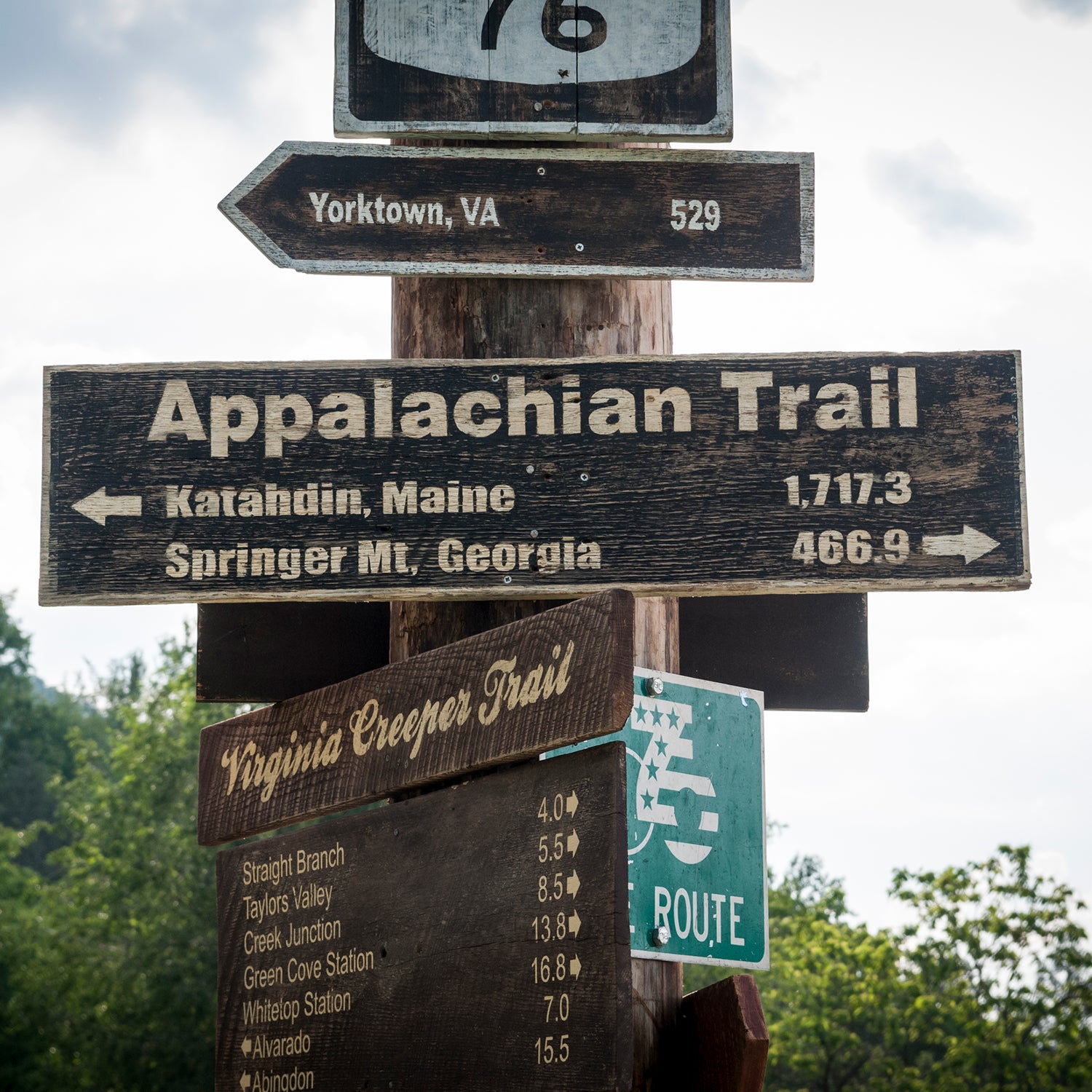James L. Jordan, 30, of West Yarmouth, Massachusetts, appeared in federal court Monday, where he was╠²charged with with intent to commit murder after a bloody attack early Saturday morning on the Appalachian Trail left one hiker dead and another hospitalized. A judge ordered Jordan be held in custody pending a psychiatric evaluation.
According to the criminal complaint filed in the U.S.╠²District Court for the Western District of Virginia, the incident began when Jordan approached a group of four hikers (court filings do not indicate how the four were connected) somewhere in Jefferson National Forest in western Virginia╠²on Friday evening.╠²
In the court documents, the hikers said that Jordan was ŌĆ£acting disturbed and unstable, and was playing his guitar and singing.ŌĆØ Later that night, the four set up camp a few miles from where the first encounter occured, in Wythe County, Virginia. Jordan appeared and began threatening the hikers in their shelters, saying that he was going to ŌĆ£pour gasoline on their tents and burn them to death.ŌĆØ At that point, the four╠²hikers╠²decided to relocate their campsites. Jordan then confronted them with a knife. Two of the hikers ran north╠²on the trail to escape. They called 911 at 2:30 A.M., saying that they were being chased by a man with a knife.
Allegedly, Jordan eventually gave up the chase and returned to the campsite, near Mount Rogers National Recreation Area. He then reportedly╠²began yelling at the two remaining hikers, a man and a woman. A verbal altercation occurred╠²between Jordan and the male hiker, who the FBI identified on Tuesday as 43-year-old Richard S. Sanchez Jr., of Oklahoma. Sanchez made an emergency call from his cell phone. Jordan then began stabbing him╠²in the upper part of his body as the female hiker, who has not been identified, looked on.╠²
According to the affidavit, when she saw her male companion fall to the ground, the female hiker attempted to run away. Jordan chased after her. As he caught up to her, the female hiker raised her arms in surrender. Jordan then began stabbing her.╠²She suffered╠²several stab wounds before falling down and playing dead. Jordan then left and returned to the campsite, according to authorities.╠²╠²
After Jordan left, the female╠²hiker got up╠²and continued to run down the trail, eventually coming upon a duo who were camping╠²just off the trail. These two backpackers then helped the female victim hike six more miles to a trailhead, where they called 911. The wounded hiker was transported to a nearby medical center in Bristol, Tennessee, where she is╠²recovering from her injuries.╠²
Jordan, meanwhile, made his way back down the trail and approached another pair of backpackers who were asleep in their tent, shouting at them that he needed a flashlight.
ŌĆ£They were real reluctant to just talk to him. They thought it was a little unusual,ŌĆØ said Wythe County sheriff Keith Dunagan at a press briefing on Sunday. ŌĆ£They didnŌĆÖt even see the person, and luckily they didnŌĆÖt come out of the tent.ŌĆØ
Using pings from a nearby cell-phone tower, authorities were able to ascertain the approximate location of the first stabbing. The tactical team of the Wythe County SheriffŌĆÖs Office╠²then began the four-mile hike to the crime scene. At 6:14 on Saturday morning, the team arrived at the campsite where the first attack occurred. There╠²it╠²found Sanchez's body, who died from his injuries,╠²along with a dog╠²which then led the team╠²to the suspect. The deputies found╠²blood on JordanŌĆÖs clothes and arrested him.
The hikers said that Jordan was ŌĆ£acting disturbed and unstable, and was playing his guitar and singing.ŌĆØ
ŌĆ£We had our whole tac team up there, so he wisely surrendered himself,ŌĆØ said╠²Dunagan.
According to the court documents,╠²the tactical team╠²also discovered a large knife, believed to be the murder weapon, in close proximity to the victimŌĆÖs body.
Both the female stabbing victim and the two hikers who fled from Jordan identified him as the attacker. The sheriffŌĆÖs department, working in concert with the Virginia State Police,╠²closed approximately 16 miles of trail to complete a crime-scene investigation. That section of the trail was reopened on Sunday.
Because the Appalachian Trail is administered by the National Park Service, the FBI has the ultimate jurisdiction╠²over crimes committed there.╠²Dee Rybiski, a spokesperson for the FBI field office in Richmond, Virginia, confirmed by phone on Monday that that officeŌĆÖs Evidence Response Unit was gathering evidence╠²on the trail.
Jordan, who gave himself the trail name ŌĆ£Sovereign,ŌĆØ has been a known nuisance on the trail for several months.╠²In mid-April, he allegedly╠²threatened several hikers at a shelter in Tennessee. When the hikers arrived at a hostel a day or so later, they reported the incident to Mike Hensley, sherriff of Unicoi County, Tennessee, who interviewed them late that night.
ŌĆ£We knew there was trouble down here with this boy,ŌĆØ Hensley told me by phone on Monday. ŌĆ£What really got my attention was that one of the hikers said he told them, ŌĆśItŌĆÖs going to be a bad day for hikers on the trail.ŌĆÖŌĆØ Upon hearing that, Hensley says he immediately deployed deputies, but they were unable to locate Jordan. Authorities in North Carolina observed him a day or so later, but there was no warrant for his arrest, so they did not detain him.
According to Hensley, hikers observed Jordan behaving strangely at a trailhead on April 21,╠²asking thru-hikers for the password needed to get on the trail.╠²Then, on April 22, Jordan appeared at a road crossing where trail angels were handing out food to thru-hikers. Jordan initiated a verbal argument with some of the backpackers there, who also alerted authorities. He was apprehended with a fake ID, marijuana, and other drug paraphernalia. He was also carrying a 17-inch survival knife.╠²That knife is being held in the evidence room at the Unicoi╠²SheriffŌĆÖs Office. ItŌĆÖs unclear when or where he purchased the knife used to kill the hiker this weekend.
According to Hensley, none of the hikers who had been assaulted by Jordan in the April incident were willing to press charges or testify in court, so Jordan was arrested only for the fake ID and drug charges. He pled guilty and was ordered to stay off the trail.
ŌĆ£I done all I could do,ŌĆØ╠²says Hensley. ŌĆ£The only thing╠²I could do is go with the charges I had. I knew this guy was a serious problem.ŌĆØ But news of his threatening behavior made its way up the trail, as reports of ŌĆ£SovereignŌĆØ╠²harassing other hikers continued.
Matthew ŌĆ£OdieŌĆØ Norman, a well-known former AT thru-hiker and founder of the HikerŌĆÖs Yearbook (a yearly record of hikers on the trail), encountered Jordan on May 2 at a trailhead near TennesseeŌĆÖs Roan Mountain State Park. Norman recognized Jordan from his arrest photo, which had╠²been widely circulated in the trail community, and invited Jordan to dinner.
ŌĆ£We all knew about his violent interactions by then,ŌĆØ Norman told me by phone on Monday from a motel near Abingdon, Virginia,╠²where the FBI has housed him and four other witnesses to JordanŌĆÖs crime. ŌĆ£My intention was to get him off the trail for his own safety and the safety of other hikers.ŌĆØ
Norman says that, over dinner, Jordan told him that hikersŌĆöwho Jordan called ŌĆ£the mountain peopleŌĆØŌĆöwere being threatened by ŌĆ£infiltrators who were trying to steal their instrumentsŌĆØ and that Jordan was remaining on the trail in order to protect the ŌĆ£mountain peopleŌĆØ from harm.
According to Norman, Jordan also said that he had family in Maryland. Norman offered to buy him a Greyhound bus ticket there, and Jordan accepted. The two, along with JordanŌĆÖs dog, traveled 90 miles to Johnston City, Tennessee, to put him on the bus.
The decision to do more to alert hikers to the potential danger Jordan posed rested with the National Park Service.
ŌĆ£I didnŌĆÖt want to put him in anywhere near a trail town,ŌĆØ says╠²Norman.
After dinner, Norman says Jordan and his dog (who was wearing a service-animal harness)╠²spent a night in a Tennessee motel. On May 3, Jordan╠²boarded a northbound bus. But apparently he╠²and his dog disembarked at the next stop.
On May 5, backpackers negative encounters with Jordan in and around Shenandoah National Park.
Unlike previous cases of╠²hikers being╠²attacked or killed on the Appalachian Trail, one thing that appears to distinguish this one╠²is that it was preceded by six weeks of complaints about JordanŌĆÖs behavior. On Monday, hikers took to social-media sites, wondering╠²why more had not been doneŌĆöparticularly given the number of thru-hikers in Virginia this time of year.
Brian King, the publisher at the Appalachian Trail Conservancy (a nonprofit dedicated to the preservation and management of the trail),╠²says that the ATC was well aware of the recurring complaints about Jordan and had been urging hikers to contact local authorities or call 911. The organization had also asked its ridge runners (people located along the trail to assist and answer questions)╠²to alert hikers to possible encounters with Jordan.
ŌĆ£The threats that Jordan was making were very much on our radar,ŌĆØ says King.
Hikers I spoke with said they did not see any warnings posted or any other alerts about potential violence in the region. The National Park Service referred all questions╠²to the FBI, which did not know if any warnings had been posted, since that would have taken place before the crime.
Norman says he and other hikers still want an answer as to why Jordan was allowed to remain on the trail.
ŌĆ£WeŌĆÖre in absolute shock and disappointed that there was nothing more that could have been done,ŌĆØ╠²says Norman.╠²


